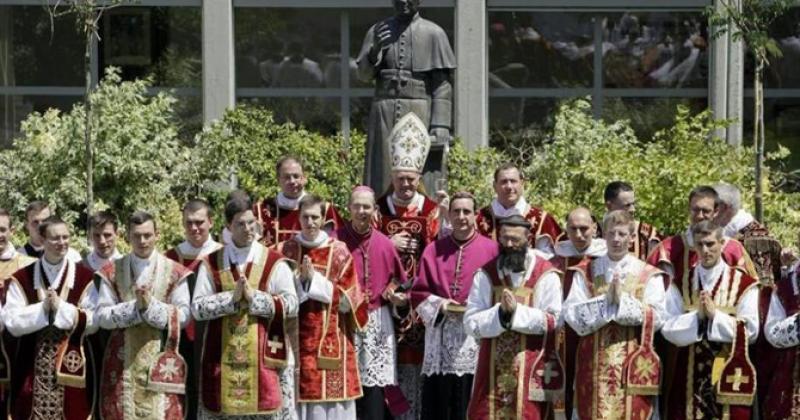Ecclesia Dei’s secretary Guido Pozzo: “We are working on improving the Fraternity’s legal status”
“We are currently working on improving certain aspects of the canonical form, which will be the personal Prelature.” Archbishop Guido Pozzo, secretary of the Ecclesia Dei commission, which is in charge of dialogue with the Fraternity of St. Pius X, has confirmed to Vatican Insider that the moment of full communion with the Lefebvrians is near. The goal of an agreement is already in sight although it is still going to take some time.
On 29 January 2017, the superior of the Fraternity of St. Pius X, Bishop Bernard Fellay, appeared on French television programme Terres de Mission broadcast by TV Liberté.
Fellay confirmed that the agreement process is underway and that in order to arrive at a canonical solution there will be no need to wait for the situation within the Church to be “completely satisfactory” in the eyes of the Fraternity of St. Pius X. Over the past few years, the Fraternity has not stopped mentioning the Pope’s name and praying for him during mass celebrations. Fellay saw Francis’ attitude towards the Fraternity within the context of his focus on the “peripheries” and explained the importance of ending the split from Rome.
The path of reconciliation following the mini-schism sparked by the four illegitimate episcopal ordinations celebrated by Mgr. Marcel Lefebvre in 1988, began in 2000, when the Lefebvrians travelled to Rome for the Jubilee. John Paul II gave a nod to new talks starting. Communication intensified under Benedict XVI’s pontificate, with open doctrinal questions being examined. Ratzinger first liberalised the use of the preconciliar missal and then remitted the excommunications of the Fraternity’s four bishops. Under Francis’ pontificate not only did this communication continue but it became valid and licit for Lefebvrian priests to confess faithful during the Jubilee of Mercy. This concession was extended indefinitely in the letter “Misericordia et Misera”.
As far as doctrinal issues are concerned, the main problems seem to have been overcome in view of an agreement. Members of the Fraternity were apparently asked to remain faithful to the essential aspects of being a Catholic, in other words the “professio fidei”, belief in the validity of the sacraments celebrated with the Novus Ordo (the liturgy that resulted from post-conciliar reform) and obedience to the Pope. There was a discussion and a sharing of ideas regarding the relationship between the magisterium and tradition, while subjects linked to ecumenism, religious freedom and the relationship between the Church and the world still need to be looked into further and could be the cause of continued disagreement.
During the course of the television interview, Fellay, in addition to recalling Francis’ concession regarding the sacraments of reconciliation and the anointing of the sick, also mentioned the Fraternity’s priestly ordinations, stating that these take place with the Holy See’s authorisation and without the need for the local bishop’s consent. As things stand, Pozzo said, the situation is more complex and stems from a decision taken by Benedict XVI and the Congregation for the Doctrine of the Faith a few years ago. “The Holy See,” Ecclesia Dei’s secretary explained,” allows and tolerates the Fraternity of St. Pius X’s priestly ordinations, considering them valid but not licit, as long as the local bishop is informed of the names of the candidates for ordination. Pope Francis has only declared legitimate the administration of the sacraments of penance and the anointing of the sick. It is precisely in order to make all the other sacramental acts legitimate as well as valid that a canonical solution needs to be found for the Fraternity.”
The path chosen for the canonical solution, as is known, is the personal Prelature, a new figure introduced in the new Code of Canon Law in 1983 and until today only applicable to the Opus Dei. Over the course of recent years, there have been an increasing number of voices speaking out against the agreement. Richard Williamson , one of the four bishops whose excommunication was remitted by Benedict XVI, left the Fraternity and founded a more extremist group, proceeding with new episcopal ordinations. Fellay’s position, on the other hand, seems more in line with that of the Fraternity’s founder, Archbishop Lefebvre, who, back in 1988, came very close to reaching an agreement with the then Cardinal Joseph Ratzinger, Prefect of the Congregation for the Doctrine of the Faith, only for it then to fall through at the last minute.
